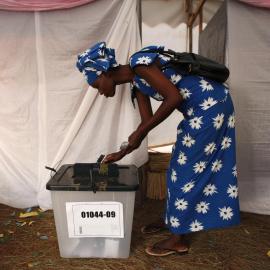To the Editor:
Alan J. Kuperman's analysis of the Rwandan genocide ("Rwanda in Retrospect," January/February 2000) raises important and troubling questions about the international community's ability to respond to mass slaughter. Kuperman is correct that many groups, including my own organization, were tardy in labeling the killings in Rwanda "genocide," and several of his practical suggestions are well taken. But in at least three crucial aspects, his perspective is misguided -- and if adopted by policymakers in the future, even dangerous.
Although the exact dimensions of the carnage may not have been known for several weeks, once they were revealed there was no excuse not to believe that the killings could quickly assume a massive scale. There was ample precedent in Rwanda for such widespread bloodshed, as human rights organizations had been reporting for years. One year before the 1994 genocide, the U.N. Commission on Human Rights' own expert on extrajudicial executions visited Rwanda and issued detailed recommendations in August 1993 to address "massacres of civilian populations" in which "it has been shown time and time again that government officials were involved."
What Kuperman is at pains to deny is that, quite apart from a lack of information, the U.N.'s inaction -- fully abetted by the United States -- was caused by an utter failure of will. We do not need the U.N.'s damning self-assessment to know that, whether or not General Romeo Dallaire's call for additional troops would have prevented the slaughter, his recommendations were not even relayed to the Security Council by the secretary-general. Michael Barnett, the political officer responsible for Rwanda at the U.S. Mission to the U.N., made this clear in 1997. Furthermore, Secretary-General Boutros Boutros-Ghali's unwillingness to risk entanglement was buttressed by demands from the United States, fearing another Somalia, to withdraw the troops already in place. National Security Adviser Anthony Lake assured human rights representatives that only massive public pressure could reverse that course -- a reality confirmed by the State Department's tortured word games to avoid the term "genocide," which would have triggered treaty obligations to respond. President Clinton has rightly apologized for the sabotage of potential interventions, but Kuperman's thesis implies that the president donned that embarrassing haircloth for no good reason.
But let us assume for a moment that Kuperman is right and that ignorance as well as unfeasibility can account for U.N. and U.S. passivity. The second unfortunate implication of Kuperman's thesis is that we are under a moral imperative to stop genocide only when we can stop it completely. Even if late intervention at a minimal level could have saved "only" 75,000 lives, he does not explain how that exempts us from making the effort. Nor is Kuperman's premise that U.S. troops would have had to lead any military action self-evident. Had the United States rallied Belgium, France, or any number of African countries to reinforce the United Nations Assistance Mission in Rwanda and promised appropriate support, thousands of Rwandan lives might have been spared.
Although not an exact parallel, the recent situation in East Timor is instructive. Not only was U.S. support for Australia's intervention pivotal in stopping the military-initiated rampage there, but U.N. High Commissioner for Human Rights Mary Robinson's implicit threat to hold Indonesian leaders responsible for the crimes played no small part in gaining their cooperation. In light of that experience, Kuperman's easy assumption that Hutu extremists would not have been intimidated by the announcement of a deployment or even by the arrival of troops is questionable.
But Kuperman's final observation is perhaps his most careless. He writes that humanitarian interventions create "perverse incentives for weaker parties in such conflicts to reject compromise and escalate fighting because they expect foreign intervention or hope to attract it." This dynamic may be at work in some cases, but Kuperman cannot seriously contend that the victims in Rwanda or the innocent voters in East Timor calculatedly invited their fates. Nor does this hypothetical moral hazard justify inaction in the face of genocide. The world has ignored people responsible for such violence before; that strategy cost us some 150 million lives in the twentieth century alone. Whether it be (ideally) through international legal structures or, in extreme cases, through humanitarian intervention, surely it is worth trying a different approach in the 21st century. Making killers consistently pay for their crimes will not eliminate mayhem at the international level any more than it does at the domestic level, but it could at least reduce the cost.
William F. Schulz
Executive Director, Amnesty International USA
